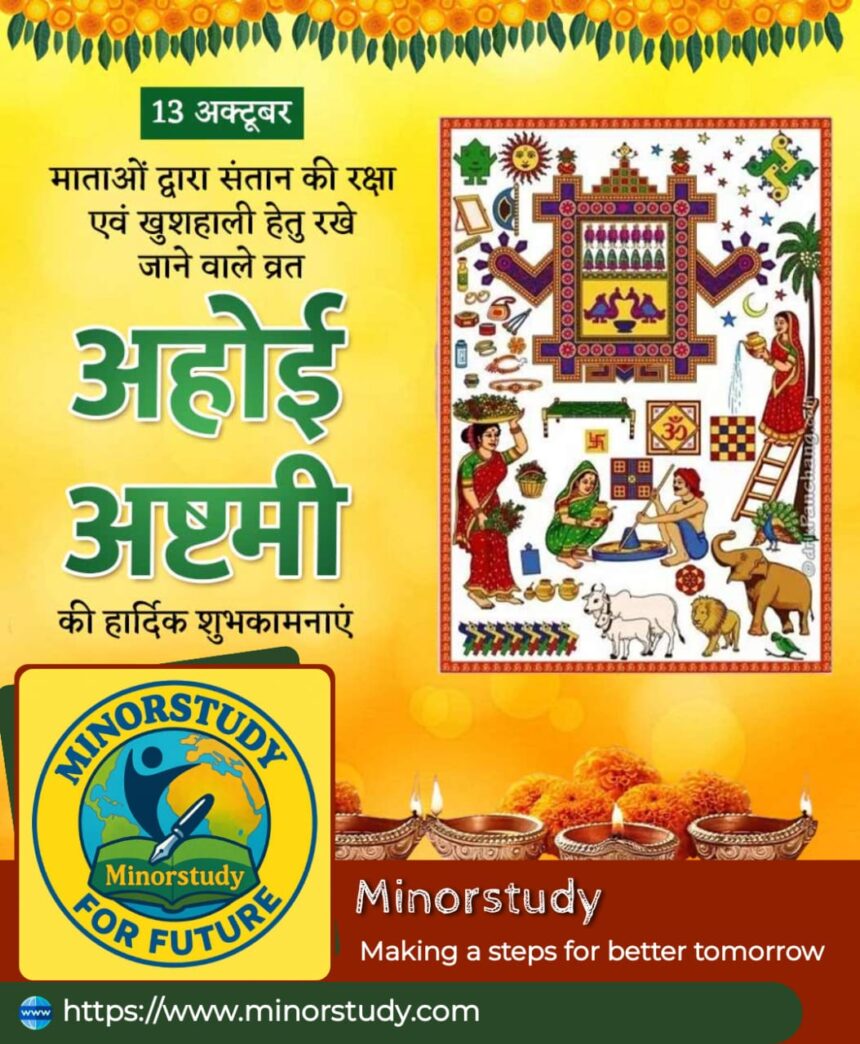🌸 Introduction – What Is Ahoi Ashtami?
Ahoi Ashtami is one of the most emotionally significant Hindu festivals celebrated by mothers across India, especially in North India. It is a day filled with faith, devotion, and prayers for the long life and prosperity of children. On this sacred occasion, mothers observe a nirjala fast (without food or water) from sunrise to the sighting of the stars or the moon, depending on regional customs.
- 🕉️ History of Ahoi Ashtami
- 📜 Timeline of Ahoi Ashtami
- 🌼 Significance of Ahoi Ashtami
- 💖 1. Celebration of Motherhood
- 🌠 2. The Power of Repentance
- 🙏 3. Strengthening Family Bonds
- 🌾 4. Agricultural and Seasonal Connection
- 🌙 5. Women’s Empowerment Through Faith
- 🪔 Observance and Rituals of Ahoi Ashtami
- 1. Pre-Dawn Preparations
- 2. Drawing the Ahoi Mata
- 3. The Nirjala Fast
- 4. Offering and Worship
- 5. Evening Ritual and Star Sight
- 6. Community Celebration
- 🌷 Facts About Ahoi Ashtami
- 📅 Ahoi Ashtami 2025 – Date and Timing
- 🌼 Wishing on Ahoi Ashtami
- 📖 Importance of Ahoi Ashtami in Daily Life and Society
- 🌼 1. Emotional Strength for Mothers
- 💞 2. Preservation of Family Values
- 🌎 3. Cultural Continuity
- 🌺 4. Moral Reflection
- 🌿 5. Psychological Peace
- 💡 Key Takeaways and Important Points
- 🙏 FAQs About Ahoi Ashtami
- 🌻 Conclusion – The Eternal Spirit of Ahoi Ashtami
Ahoi Ashtami typically falls eight days before Diwali and four days after Karva Chauth. It is celebrated on the Ashtami Tithi (eighth day) of the Krishna Paksha (waning phase of the moon) in the Kartik month according to the Hindu lunar calendar.
This festival holds immense value for mothers. They not only pray for their children’s well-being but also reconnect spiritually with the divine feminine energy — Maa Ahoi, who is believed to protect children from harm and bless families with abundance.
🕉️ History of Ahoi Ashtami
The origin of Ahoi Ashtami is rooted in a touching legend of a mother’s repentance and divine forgiveness. Let’s dive into its beautiful story.
🌿 The Legend of Maa Ahoi
Long ago, a woman lived in a village with her seven sons. As Diwali approached, she decided to renovate her home and went to the forest to gather soil. While digging, her spade accidentally killed a baby lion cub (or hedgehog in some versions). She felt deep remorse and returned home sorrowful.
Within a few days, her seven sons mysteriously died one after another. The grieving mother realized this was the consequence of her unintentional sin. Years later, an old sage advised her to pray to Goddess Ahoi Mata on the Ashtami of Kartik month. Following this advice, she drew the image of Ahoi Mata with seven sons and stars on a wall and observed a fast sincerely. By divine grace, her sons were restored to life.
Since then, mothers have been observing Ahoi Ashtami Vrat with devotion, fasting, and prayers to protect their children from harm and misfortune.
📜 Timeline of Ahoi Ashtami
| Year | Date | Day | Key Significance |
|---|---|---|---|
| 2023 | November 5 | Sunday | Worship of Ahoi Mata and fast for children’s safety |
| 2024 | October 27 | Sunday | Eight days before Diwali |
| 2025 | October 16 | Thursday | Observed with faith for children’s prosperity |
| 2026 | November 4 | Wednesday | Linked to Kartik Krishna Ashtami |
| 2027 | October 24 | Sunday | Motherhood celebration and devotion |
Ahoi Ashtami’s timing is determined based on Ashtami Tithi and moonrise, which marks the conclusion of the fast.
🌼 Significance of Ahoi Ashtami
Ahoi Ashtami is much more than a ritual — it’s a spiritual expression of motherhood and unconditional love. The significance of this festival unfolds across emotional, religious, and cultural dimensions:
💖 1. Celebration of Motherhood
This festival is a tribute to the sacred bond between mother and child. It reflects the essence of selfless love and sacrifice — where a mother fasts without food or water, praying solely for her child’s happiness.
🌠 2. The Power of Repentance
The story of Ahoi Mata symbolizes how honest repentance and devotion can wash away even unintended sins. It teaches that the Divine always forgives those who seek mercy with pure hearts.
🙏 3. Strengthening Family Bonds
As families gather during Ahoi Ashtami, it becomes a day of unity, tradition, and shared emotion. Children witness their mother’s devotion, fostering values of gratitude and respect.
🌾 4. Agricultural and Seasonal Connection
Traditionally, Ahoi Ashtami coincides with the harvest season, symbolizing fertility, abundance, and protection of progeny and crops.
🌙 5. Women’s Empowerment Through Faith
This vrat is also seen as a spiritual empowerment for women — it gives them strength, faith, and emotional endurance through devotion.
🪔 Observance and Rituals of Ahoi Ashtami
Ahoi Ashtami is observed with deep devotion and specific rituals that vary slightly across regions but carry the same spiritual core.
1. Pre-Dawn Preparations
Mothers wake up early before sunrise, clean their homes, take a holy bath, and prepare for the fasting rituals.
A sacred space is created in the puja room or courtyard with an image of Ahoi Mata — often hand-drawn or printed.
2. Drawing the Ahoi Mata
Traditionally, mothers draw Ahoi Mata on a wall using red mud or geru. The image includes seven sons, stars, and animals (like lion or hedgehog), symbolizing creation and protection.
3. The Nirjala Fast
Women observe a strict fast without water or food until they see the stars or moon at night.
They pray with folded hands:
“Maa Ahoi, bless my children with health, long life, and happiness.”
4. Offering and Worship
Offerings include roli, rice, milk, water, fruits, and silver Ahoi pendants (Ahoi Yantra).
A special prayer is read from the Ahoi Vrat Katha, narrating the legend of Ahoi Mata.
5. Evening Ritual and Star Sight
When the stars or the moon appears, women offer arghya (water offering) to them and look at Ahoi Mata’s image through a sieve, breaking their fast afterward.
6. Community Celebration
In many regions, especially in Delhi, Haryana, and Uttar Pradesh, women gather in groups to sing devotional songs and share prasad, strengthening the community spirit.
🌷 Facts About Ahoi Ashtami
Here are some lesser-known and interesting facts about this sacred day:
Ahoi Mata is considered an incarnation of Goddess Parvati, symbolizing protection and maternal love.
The fast of Ahoi Ashtami is similar to Karva Chauth, but instead of praying for husbands, it’s for children’s welfare.
The image of Ahoi Mata is traditionally drawn on a wall, but today many families use silver Ahoi pendants or printed pictures.
Seven stars represent the seven sons from the legend and are considered divine witnesses.
Some communities perform this vrat for future children, not just existing ones, believing it brings fertility blessings.
No harsh words or quarrels are allowed on this day — peace and positive energy must be maintained.
The Ahoi Ashtami puja thali often includes thread or silver coins tied with red thread and stored for blessings throughout the year.
📅 Ahoi Ashtami 2025 – Date and Timing
Date: Thursday, October 16, 2025
Ahoi Ashtami Puja Muhurat: 05:42 PM – 07:00 PM (IST)
Ashtami Tithi Begins: October 15, 2025 – 10:22 PM
Ashtami Tithi Ends: October 16, 2025 – 09:48 PM
Star Sighting Time: Around 6:30 PM (Varies regionally)
🌼 Wishing on Ahoi Ashtami
Here are some warm wishes and quotes you can share with your loved ones:
🌸 “May Maa Ahoi bless your children with health, happiness, and success. Happy Ahoi Ashtami!”
💫 “On this sacred day, may every mother’s prayers reach the heavens and protect her children forever.”
🌷 “Wishing you a divine Ahoi Ashtami filled with hope, devotion, and maternal love.”
🕉️ “Let Ahoi Mata light up your home with joy, love, and blessings of prosperity.”
✨ “Ahoi Ashtami reminds us that a mother’s love can move mountains — and even touch the Divine.”
📖 Importance of Ahoi Ashtami in Daily Life and Society
🌼 1. Emotional Strength for Mothers
Fasting with deep devotion gives women a sense of purpose, emotional strength, and connection to their spiritual roots.
💞 2. Preservation of Family Values
This festival nurtures values of gratitude, faith, and unity, which are essential for family and social harmony.
🌎 3. Cultural Continuity
Ahoi Ashtami keeps Indian traditions and cultural storytelling alive, passing ancient wisdom from one generation to the next.
🌺 4. Moral Reflection
The legend encourages accountability and humility, reminding us that even mistakes can be corrected through truth and repentance.
🌿 5. Psychological Peace
The act of fasting and prayer brings inner calm, mental focus, and peace — essential in modern stressful lives.
💡 Key Takeaways and Important Points
Festival Name: Ahoi Ashtami
Purpose: Blessings for children’s long life and prosperity
Date (2025): October 16, Thursday
Deity Worshipped: Maa Ahoi (Goddess Parvati)
Fasting Type: Nirjala (without food and water)
Major Ritual: Star or moon sighting before breaking the fast
Core Belief: Repentance and devotion can overcome destiny
Symbolism: Maternal sacrifice, divine protection, and family harmony
🙏 FAQs About Ahoi Ashtami
Q1. Who is worshipped on Ahoi Ashtami?
A: Maa Ahoi, believed to be an incarnation of Goddess Parvati, is worshipped on this day.
Q2. What is the main purpose of Ahoi Ashtami fast?
A: Mothers observe this fast for the long life, prosperity, and well-being of their children.
Q3. Can unmarried women observe Ahoi Ashtami?
A: Yes, unmarried women or those desiring children also observe this vrat for future blessings.
Q4. When do women break the fast?
A: The fast is broken after sighting the stars or the moon at night, depending on local tradition.
Q5. What food is offered as prasad?
A: Halwa, puri, fruits, and special vrat-friendly foods are offered as prasad.
Q6. Is it mandatory to draw Ahoi Mata’s image?
A: Traditionally yes, but modern families often use printed or silver Ahoi pendants.
Q7. What does the number seven symbolize in this vrat?
A: The seven sons from the legend represent divine blessings and completeness.
🌻 Conclusion – The Eternal Spirit of Ahoi Ashtami
Ahoi Ashtami is not just a festival; it is a living testimony to a mother’s love, prayer, and divine faith. It teaches us that faith and devotion can transcend misfortune, and that repentance and purity of heart can heal even the deepest wounds.
In today’s fast-paced world, Ahoi Ashtami stands as a beacon of hope, family unity, and spiritual grounding. It connects generations, reminding us that our traditions carry timeless values — love, sacrifice, forgiveness, and faith.
So this Ahoi Ashtami 2025, let’s celebrate not only the rituals but the beautiful essence of motherhood and compassion that this festival embodies.
🌼 “A mother’s prayer is the purest sound that reaches the heavens — and Ahoi Ashtami is its divine echo.” 🌼









**mind vault**
mind vault is a premium cognitive support formula created for adults 45+. It’s thoughtfully designed to help maintain clear thinking
**breathe**
breathe is a plant-powered tincture crafted to promote lung performance and enhance your breathing quality.
I saw a lot of website but I think this one has got something extra in it in it